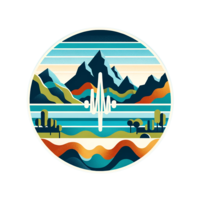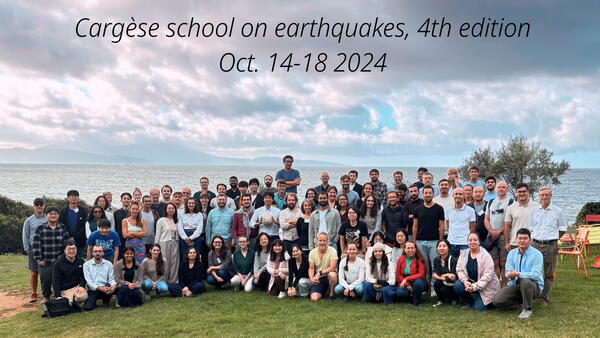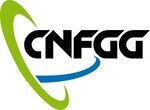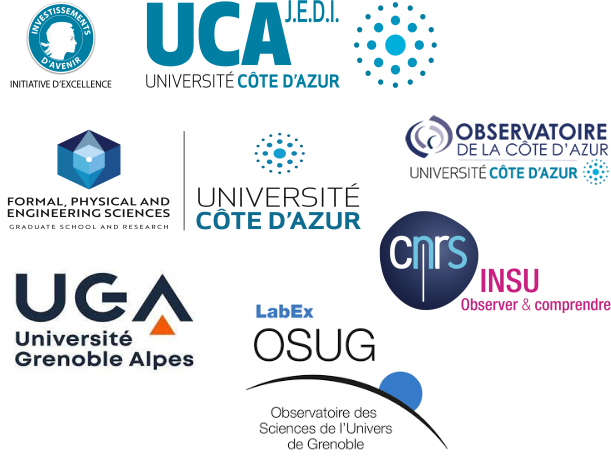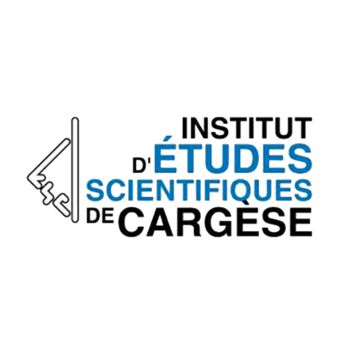|
|
|
|
Latest news The 90 participants represented 25 nationalities from 16 countries, with 37% identifying as female.
The program, including posters: cargese-earthquake-4th-program-FINAL.pdf Slides of presentations in pdf format (not all available): https://sdrive.cnrs.fr/s/xKkYXQppYHDGEaN
The week in 60 seconds
School outline Earthquakes remain unpredictable, despite decades of intense investigations into possible precursory phenomena. The main difficulty lies in our incomplete knowledge of the state of stress on active faults at seismogenic depths, and a full understanding of how rupture initiates and stops in a complex medium characterized by a variable stress field acting on complex fault geometries. In the last decade, however, great advances have converged toward a much more complete picture of earthquake-related processes. The quality and quantity of seismic data, as well as their diffusion to research scientists through open-data policies, have been much improved, most recently owing to the development of very dense and/or very sensitive seismic networks and a gain in location accuracy; the ubiquitous nature of aseismic slip has become apparent; and recent mega-thrust and continental earthquakes have provided the seismological community with very rich datasets that help illuminate possible relationships between seismic and aseismic processes. This school will follow the third edition in 2021 (https://earthquakes3.sciencesconf.org/). We typically host 100 participants, with a majority of PhD students and post-docs, from more than 15 countries. The goal remains to give an accurate snapshot of our current understanding of earthquakes, in the light of recent advances. About 20 scientists from all around the world (mostly Europe and the US), at the cutting-edge of earthquake research, will give lectures, covering various topics related to recent developments in earthquake processes, including nucleation, triggering, rupture, and the seismic cycle as a whole. The school is intended to stimulate the emergence of a much wider understanding of the current issues and progress among young scientists (PhDs and post-docs), and will thus facilitate future collective progress towards earthquake preparedness and forecasting, as well as the development of international research networks. The school will revolve around 4 main sessions:
The first part of the afternoons is dedicated to group discussions on topics of special interest and hands-on tutorials. Registering and Accomodation fees Accommodation fees: There are no registration fees but your accommodation will be due upon arrival. The fees (371€) will cover accommodation in a shared room (2 per room) with breakfasts and lunches included. Dinners, except one, are not covered. We will organize a transfer by bus from/to Ajaccio airport on Oct. 13th and 19th; this implies that you should prefer flights arriving in the middle of Sunday afternoon and leaving on Saturday morning. You can pay the fees during the school with a credit card. Pre-registation and abstract submission (opened until June 10th): Connect and register via the IESC link below to submit a pdf containing an abstract file (no more than 1 page) with your name, name of supervisors/co-authors, institution(s), which of the four sessions you want to apply for, and if you have a preference for an oral presentation or a poster. We also welcome a brief description of your research interests and your motivation to participate in this school. This description is mandatory if you require financial support to participate in this school. In this case, specify if you would need support for plane tickets (give us a quote) and/or registration (which includes accomodation). Note that you should apply as "auditor" and no payment is required at this stage Current status (July 14th): most selected applicants should have now received a confirmation and can proceed to final registration (see below). We are building a waiting list as we expect a few spots to become available. Final registration: if selected, connect again on the registration platform to confirm and enter your flight details and accommodation preferences. Registering implies that you commit to paying the accommodation fees and agreeing to the conditions. If you need a letter of invitation for your visa, please send a request to: earthquakes4@sciencesconf.org
Logistics The school will be held at the Institut des Etudes Scientifiques de Cargèse, Corsica, France. All the details on the location and the facilities can be found on the IESC webpage. Transportation will be arranged by bus from Ajaccio airport (AJA) on Sunday 13th afternoon and Saturday 19th morning. Most flights to Ajaccio are from Paris, Marseille and Nice. It is also possible to take a ferry from Marseille, Toulon, and Nice. For flight transit in Paris, you might have to transfer between CDG (international) and ORY (domestic) airports: https://easycdg.com/transfer-cdg-to-orly-airport/. Some extra information, and in particular on CO2 emissions of the different options can be found here. Note that the beach is a 10-minute walk from the Ajaccio terminal, and the city center is 15 minutes by bus (Line 8, runs every 30 minutes). Recommended format for posters: A0 portrait
Scientific Committee • Mathilde Radiguet (University Grenoble Alpes, CNAP) , List of confirmed speakers Jean-Philippe Avouac (Caltech, 🇺🇸), Sylvain Barbot (USC, 🇺🇸), Michael Blanpied (USGS 🇺🇸), Roland Burgmann (UC Berkeley, 🇺🇸), Camilla Cattania (MIT, 🇺🇸), Fabio Corbi (IGAG-CNR 🇮🇹), Brittany Erickson (Univ. of Oregon, 🇺🇸), Ake Fagereng (Cardiff University 🏴), Alice Gabriel (UC San Diego 🇺🇸), Dmitry Garagash (Dahlousie University 🇨🇦) Yihe Huang (Univ. Michigan 🇺🇸), Romain Jolivet (ENS Paris 🇨🇵), Yoshi Kaneko (Kyoto University 🇯🇵), Aitaro Kato (ERI, Univ. of Tokyo 🇯🇵), Chris Marone (Univ. di Roma 🇮🇹), Andreas Rietbrock (KIT 🇩🇪), Ioannis Stefanou (Ecole Centrale de Nantes 🇨🇵) Sponsors
Reseach project "Science of Slow-to-Fast Earthquakes" https://en.slow-to-fast-eq.org/ French National Committee for Geodesy and Geophysics (IUGG) https://site.cnfgg.fr/historique University Côte d'Azur UCAJEDI: National Initiative of Excellence progam of University Côte d'Azur http://univ-cotedazur.fr/en/idex/initiative-of-excellence-idex EUR SPECTRUM: Formal, physical and engineering sciences graduate school of University Côte d'Azur https://spectrum.univ-cotedazur.fr/ Côte d’Azur Observatory and its two scientific programs: - Dynamics of the Earth system INSU, the CNRS National Institute for Earth Sciences and Astronomy, with support of the TelluS Program University Grenoble-Alpes https://www.univ-grenoble-alpes.fr/ Grenoble Observatory Contact For enquires please use the contact link on the left colum |
